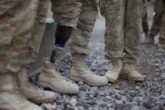Reports
Showing 421-440 of 697 Publications
-
Defense / National Security Human Capital Program
The Labyrinth WithinThe current austere fiscal environment has brought the debate over the defense budget to the forefront of policymakers’ agendas. Technical terminology once deemed irrelevant f...
By Michelle Shevin-Coetzee
-
From Sanctuary to Battlefield
The United States is profoundly reliant on the ability to use space for its security. Though little appreciated outside of professional and expert circles, space – or, more pr...
By Elbridge Colby
-
The Presence Problem: Naval Presence and National Strategy
Experts examine naval presence around the globe and recommend another look at the execution of our national strategy....
By Jerry Hendrix
-
While We Can
CNAS Executive Vice President Shawn Brimley argues that the U.S. military edge – particularly in regards to technology – is rapidly eroding. Mr. Brimley makes concrete recomme...
By Shawn Brimley
-
Defense / Indo-Pacific Security
Solving Long DivisionEight CNAS experts examine a host of issues posed by unification – including nuclear weapons and deterrence, the U.S.-Korea alliance, and relations between the countries in No...
By David Eunpyoung Jee, Elbridge Colby, Hannah Suh, Patrick M. Cronin, Richard Fontaine & Van Jackson
-
Defense / Technology & National Security
Uncertain Ground: Emerging Challenges in Land WarfareDefense Strategies and Assessments Program Senior Fellow Paul Scharre makes recommendations for enhancing strategic agility to adapt to a changing world....
By Paul Scharre
-
National Security Human Capital Program
Charting the Sea of GoodwillReport conducts a comprehensive landscape analysis of the military and veteran-service organization space and its funding sources, and finds that while the support needed by m...
By Katherine L. Kuzminski & Phillip Carter
-
Diminishing Returns? The Future of Economic Coercion
CNAS experts lay out the success of recent financial sanctions, details obstacles to their continued effectiveness, discusses how other countries like China may use similar to...
By Eric Lorber & Peter Feaver
-
National Security Human Capital Program
CNAS Needs AssessmentSenior Fellow Phillip Carter and Bacevich Fellow Katherine Kidder author a study on Southwest Pennsylvania's veterans community, drawing upon data from the Department of Defen...
By Katherine L. Kuzminski & Phillip Carter
-
National Security Human Capital Program
Passing the BatonAs the 2016 election cycle moves into full swing, four CNAS experts lay out a comprehensive overview of issues facing the veteran and military community and a plan with substa...
By Amy Schafer, Dr. Jason Dempsey, Katherine L. Kuzminski & Phillip Carter
-
Technology & National Security
Crisis ResponseAs the U.S. Marine Corps prepares to celebrate its 240th birthday, Ben FitzGerald, director of the Technology and National Security Program, and LtCol Brian Bruggeman, a forme...
By Ben FitzGerald, LtCol Brian Bruggeman & USMC
-
Defense / National Security Human Capital Program
A Nuclear Strategy and Posture for 2030Robert M. Gates Senior Fellow Elbridge Colby offers the outlines of a revised nuclear policy and posture that adapts the United States' long-standing approach to nuclear weapo...
By Elbridge Colby
-
Middle East Security / Energy, Economics & Security
After the Joint Comprehensive Plan of Action: A Game Plan for the United StatesFive CNAS Experts lay out a comprehensive strategy and concrete recommendations for how the U.S. can maximize the opportunity presented by JCPOA....
By Avner Golov, Elizabeth Rosenberg, Ellie Maruyama, Ilan Goldenberg & Nicholas Heras
-
Retreat from Range
Defense Strategies and Assessments Program Director Dr. Jerry Hendrix argues that aircraft carriers, at a cost over $13 billion a piece, risk becoming obsolete without a major...
By Jerry Hendrix
-
Transatlantic Security / Energy, Economics & Security
Lessons from Russia and the Future of SanctionsPeter Harrell, an Adjunct Senior Fellow in the Center for a New American Security (CNAS) Energy, Economics, and Security Program, examines what led U.S. policymakers to develo...
By Peter Harrell
-
The Iran Agreement and What Comes Next
In advance of Congress’ pending vote on the Joint Comprehensive Plan of Action (JCPOA), CNAS experts produced commentary on U.S. strategy after the Iran Deal....
By Avner Golov, Axel Hellman, Elizabeth Rosenberg, Ellie Maruyama, Ilan Goldenberg & Nicholas Heras
-
Technology & National Security
The $100 Billion QuestionExecutive Summary The Navy is already beginning to examine options to replace the F/A-18E/F Super Hornet, which will retire in the mid-2030s.The replacement of the F/A-18E/F w...
By Daniel Burg & Paul Scharre
-
An Intensified Approach to Combatting the Islamic State
CNAS CEO Michèle Flournoy and President Richard Fontaine have authored a new policy brief arguing that “current efforts to counter ISIS are not adequate to the task” and that ...
By Michèle Flournoy & Richard Fontaine
-
Security Cooperation and Assistance: Rethinking the Return on Investment
Dr. Dafna H. Rand and Dr. Stephen Tankel argue that despite the growth of new programs and authorities to build partnership capacity in Afghanistan, Iraq, Syria, and many othe...
By Dafna Rand & Stephen Tankel
-
Russian Motives: An Essay Exploring Russia’s Approach to Crimea and Eastern Ukraine
In this report, Benjamin F. Cumbo IV examines how Russia sees its territorial aggression in Crimea and Eastern Ukraine....
By Benjamin Cumbo & Robert D. Kaplan










